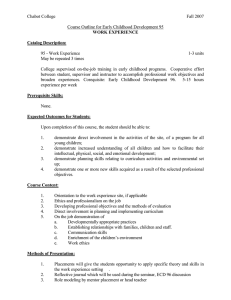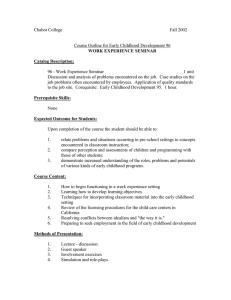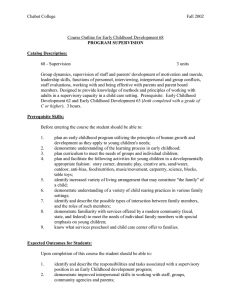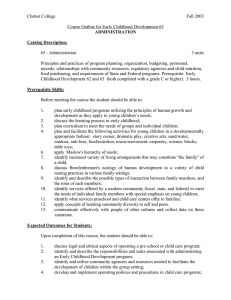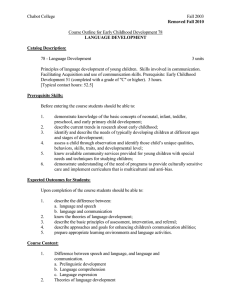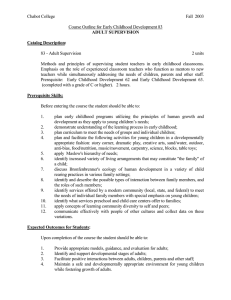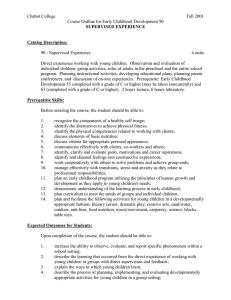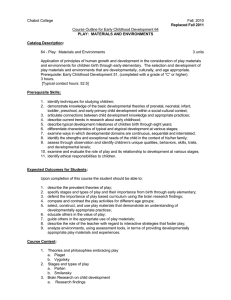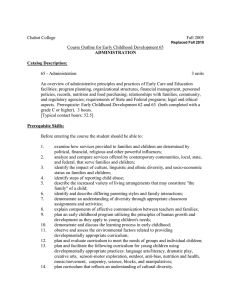Chabot College Fall 2005 Course Outline for Early Childhood Development 68
advertisement
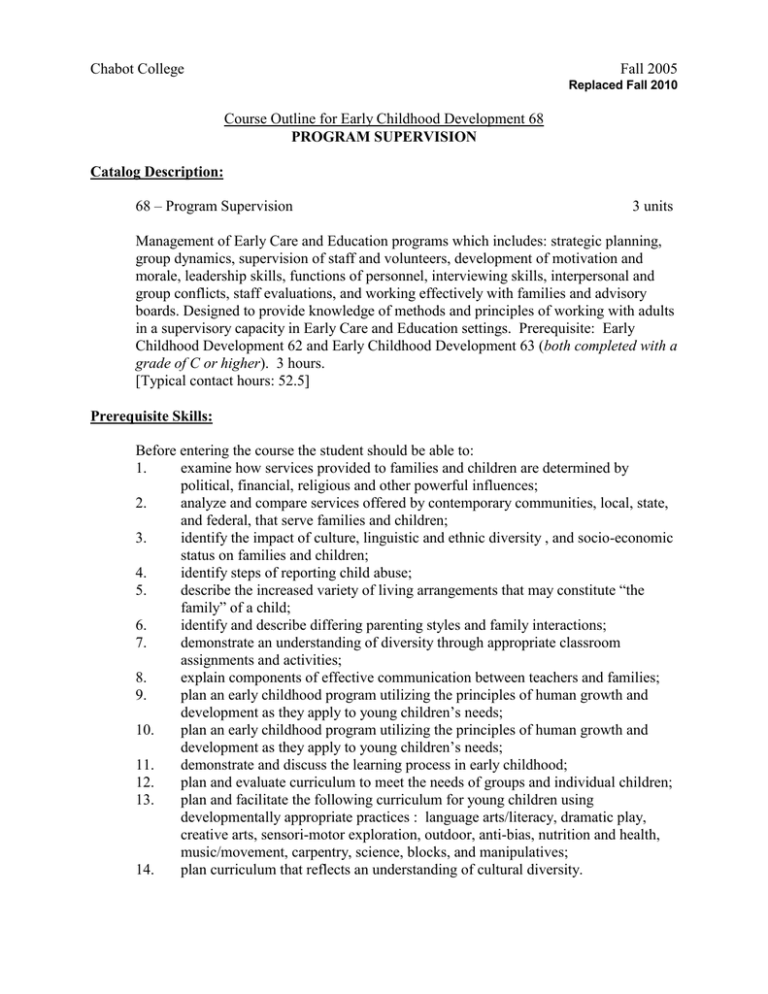
Chabot College Fall 2005 Replaced Fall 2010 Course Outline for Early Childhood Development 68 PROGRAM SUPERVISION Catalog Description: 68 – Program Supervision 3 units Management of Early Care and Education programs which includes: strategic planning, group dynamics, supervision of staff and volunteers, development of motivation and morale, leadership skills, functions of personnel, interviewing skills, interpersonal and group conflicts, staff evaluations, and working effectively with families and advisory boards. Designed to provide knowledge of methods and principles of working with adults in a supervisory capacity in Early Care and Education settings. Prerequisite: Early Childhood Development 62 and Early Childhood Development 63 (both completed with a grade of C or higher). 3 hours. [Typical contact hours: 52.5] Prerequisite Skills: Before entering the course the student should be able to: 1. examine how services provided to families and children are determined by political, financial, religious and other powerful influences; 2. analyze and compare services offered by contemporary communities, local, state, and federal, that serve families and children; 3. identify the impact of culture, linguistic and ethnic diversity , and socio-economic status on families and children; 4. identify steps of reporting child abuse; 5. describe the increased variety of living arrangements that may constitute “the family” of a child; 6. identify and describe differing parenting styles and family interactions; 7. demonstrate an understanding of diversity through appropriate classroom assignments and activities; 8. explain components of effective communication between teachers and families; 9. plan an early childhood program utilizing the principles of human growth and development as they apply to young children’s needs; 10. plan an early childhood program utilizing the principles of human growth and development as they apply to young children’s needs; 11. demonstrate and discuss the learning process in early childhood; 12. plan and evaluate curriculum to meet the needs of groups and individual children; 13. plan and facilitate the following curriculum for young children using developmentally appropriate practices : language arts/literacy, dramatic play, creative arts, sensori-motor exploration, outdoor, anti-bias, nutrition and health, music/movement, carpentry, science, blocks, and manipulatives; 14. plan curriculum that reflects an understanding of cultural diversity. Chabot College Course Outline for Early Childhood Development 68 Fall 2005 page 2 Expected Outcomes for Students: Upon completion of this course the student should be able to: 1. 2. 3. 4. 5. 6. 7. identify and describe the responsibilities and tasks associated with a supervisor position in an Early Childhood Development program; demonstrate improved interpersonal skills in working with staff, groups, community agencies and parents; examine and compare management styles in Early Care and Education settings; define the role of a supervisor in directing a staff in Early Care and Education settings; enumerate the legal and ethical aspects of directing a staff; formulate and review operational procedures, personnel and family policies; evaluate methods and compare principles of group dynamics from a leadership perspective. Course Content: 1. 2. 3. Personnel a. Changing needs of work force b. Recruitment, selection and hiring 1) Applications 2) Resumes 3) Interviewing 4) Affirmative action, diversity c. Staff handbook d. Ethical considerations e. Professional development and continuing education f. Staff meetings Families a. Assessing and meeting needs b. Communicating with diverse populations c. Enrollment process d. Transitional plans e. Handbook f. Involvement in program g. Advisory boards Program management and operations a. Legal structure 1) Private, public, non-profit 2) Board of directors 3) College programs 4) Faith based Chabot College Course Outline for Early Childhood Development 68 Fall 2005 Page 3 Course Content (Cont’d): b. 4. 5. 6. 7. Financial management 1) Budgets 2) Record keeping and taxes 3) Credit and debts 4) Grants c. Curriculum 1) Goals 2) Implementation 3) Evaluation Health and nutrition policies a. Staff b. Children Supervisory approaches/models a. Management flow chart and accountability b. Time management and organization c. Managerial functions of supervisor 1) Observation 2) Assessment 3) Evaluation d. Group dynamics and employee morale e. Environmental Rating Scales (ECERS, FDCRS, ITERS, SACERS) Relationship building a. Communication b. Supervision c. Problem Solving d. Decision Making Consultants and referrals Methods of Presentation: 1. 2. 3. 4. Lecture and discussion Projects and assignments Media presentations Guest presentations Assignments and Methods of Evaluating Student Progress: 1. Typical Assignments a. Write a paper indicating what skills or techniques of management might be appropriate to use to enhance work place performance. b. Role-play interview situations for hiring employees. c. Develop a staff or parent handbook Chabot College Course Outline for ECD 68 Fall 2005 Page 4 Assignments and Methods of Evaluating Student Progress (Cont’d): 2. Methods of Evaluating Student Progress: a. Oral and written reports b. Midterm and final exam c. Class attendance and participation d. Projects Textbook(s) (Typical): Developing and Administering a Child Care Center, Dorothy Jane Sciarra and Anne G. Dorsey, Thomson/Del Mar Learning, Clifton Park, N.Y., 2001,or latest edition. Early Childhood Environmental Rating Scale (ECERS) Revised. Thelma Harms and Richard Clifford, Teachers College Press, 2000, or latest edition. Blueprint for Action: Achieving Center Based Change Through Staff Development, Paula Jorde Bloom, Mt. Ranier, MD: Gryphon House, 2002, or latest edition. Working for Quality Child Care, Unit III, Child Care Employee Project, 2001, or latest edition. The Human Side of Child Care Administration, Sherry Storm, NAEYC, 2002 or latest edition. Special Student Materials: None. tf: ECD 68 Revised: 11-5-04
